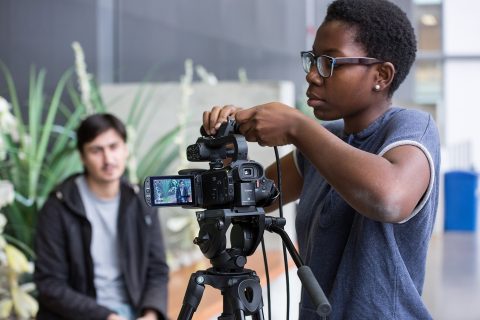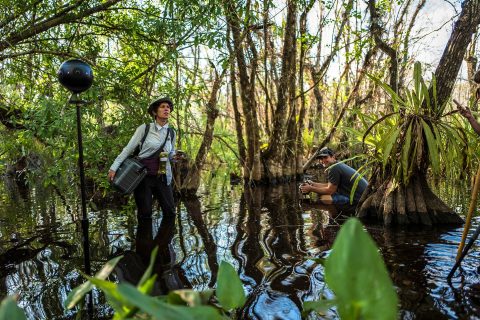Science Journalism (Minor)
Why study Science Journalism?
The Minor in Science Journalism aims to produce intelligent, thoughtful, and versatile journalists and communicators who engage citizens in a democratic society, helping them make informed decisions about their communities. With a focus on the communication of scientific topics, this professional education combines hands-on writing and audiovisual production workshops with lectures and seminars that critically examine the social and political contexts in which journalism is produced.
You’ll benefit from small class sizes and state-of-the-art facilities. Engage in research-creation projects or partake in an internship practicum.
We'll equip you with the storytelling tools you need to communicate science accurately and engagingly. Become part of our growing Science Journalism Hub.
Program highlights
- First program of its kind in Canada
- Many opportunities for hands-on learning through internships and research creation projects
- A chance to gain specialization in a field of increasing importance within media
Special funding for out-of-province students
Up to $4000 for undergraduate programs.
Program structure
Program option
- Minor in Science Journalism (24 credits)
Complete 24 credits in the Department of Journalism, which include 12 credits of core courses, and 12 credits of elective courses. The Minor is available to students beginning or currently enrolled in a BSc program.
Courses
JOUR 206 Introduction to Reporting (3 credits)
JOUR 207 Introduction to Multimedia (3 credits)
JOUR 340 Communicating Science with Society (3 credits)
JOUR 402 Specialist Reporting (3 credits) *topics course with a focus on science and health
12 credits chosen from the elective list, including: JOUR 205, JOUR 208, JOUR 209, JOUR 215, JOUR 216, JOUR 298, JOUR 302, JOUR 325, JOUR 451; COMS 360, COMS 361; ENGL 391; LOYC 340
- With permission of the program director, up to 6 of the 12 elective credits can be taken in alternative courses, if these courses meet the goals of the program.
Note: Elective courses may have limited space and require permission of various departments to enrol.
Admission criteria
Minimum cut-off averages and course requirements
- Quebec CEGEP: 22
- High School: B-
- Canadian curricula course requirements
- Accepted international qualifications
- ACT or SAT is NOT required
- AP exams are not required but may qualify you for advanced standing
- International Baccalaureate (IB) diploma: 27
- International Baccalaureate Career-related Programme (CP): 27
- Baccalauréat français: 12
- British system of education (GCE):
- A-levels: At least two A-level exams CD or
- AS-levels: At least 4 AS-level exams with equivalent results or
- BTEC: Level 3 Diploma or Extended Diploma in a related subject area with equivalent results
- Additional information for British System of Education (GCE) applicants
- University Transfers (internal/external): B-
Minimum cut-off averages should be used as indicators. The cut-off data may change depending on the applicant pool. Applicants who meet the stated minimum requirements are not guaranteed admission to these programs.
Additional requirements for admission
- Letter of intent
Application deadlines

FALL ENTRY (September)
Deadline: March 1
International applicants: Apply no later than February 1 to allow time for immigration document processing. However, applying earlier is strongly recommended. Immigration processing times vary by country, and delays could prevent you from starting your studies on time.

WINTER ENTRY (January)
Admission to this program is available for the Fall Term only.
We reserve the right to close admission to a program at any time after the official deadline without prior notice.
After your degree
- Be able to write, report and communicate scientific topics in a clear, accurate and engaging way;
- Be able to experiment with new forms of multimedia storytelling, including through audio, video, photography and social media platforms;
- Be part of a growing network of science communicators and journalists.
Other programs of interest

Prepare for the future of news. You’ll become a first-rate journalist, and a future decision-maker, capable of thinking critically and leading journalism in new directions
Department
Faculty

We are one of the most established and respected Communication Studies programs in North America, and are well known for combining creative media production with the study of media theory, criticism and history.
Department
Department of Communication Studies
Faculty

Political science teaches you how the world works. As one of Concordia’s most popular degree choices, you will meet the world up close: in class, in action and in person.
Department
Department of Political Science
Faculty


